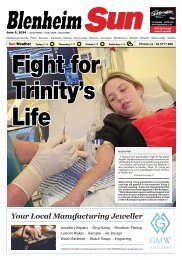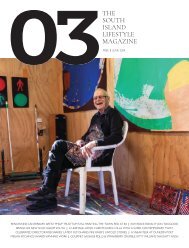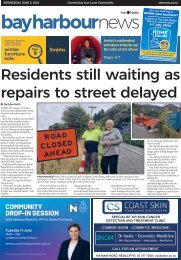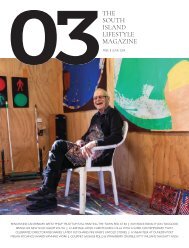Style: January 13, 2021
You also want an ePaper? Increase the reach of your titles
YUMPU automatically turns print PDFs into web optimized ePapers that Google loves.
<strong>Style</strong> | Wellbeing 65<br />
How should we be eating for optimal health?<br />
Make sure you’re eating a well-balanced diet that<br />
includes non-starchy and colourful vegetables. For<br />
optimum health, aim for eight servings of vegetables a<br />
day. Consider various ways of doing this. For instance,<br />
if you start the day with a savoury breakfast, try<br />
adding a handful of spinach. If you’re making overnight<br />
oats, why not grate in a carrot? If you’re whipping up<br />
a smoothie, add in some courgette and spinach (you<br />
won’t be able to taste them), and add vegetables like<br />
carrots and beetroot to muffins and cakes. If you aim<br />
for eight handfuls of vegetables a day, you should be<br />
getting all the main nutrients and fibre you need.<br />
Remember to also incorporate protein into your<br />
meal at the start of the day. If you don’t get enough,<br />
you might find you’re craving that scone at 9am.<br />
Protein is what keeps us fuller for longer, so aim for a<br />
really good protein hit at breakfast by adding a serving<br />
of yoghurt, eggs, oats, or cottage cheese.<br />
What role does a restful night’s sleep play in<br />
our health and wellbeing?<br />
Sleeping well is important for our overall health and<br />
wellbeing. To help achieve a restful night’s sleep, try<br />
and include wholegrain or high-fibre carbohydrates<br />
in your evening meal, such as brown rice, quinoa,<br />
kumara, lentils or chickpeas.<br />
Ensuring we get the right amount of sunlight<br />
exposure is also important as it’s how we make<br />
melatonin, the hormone we need to fall asleep.<br />
Always remember to be sun smart – slip, slop, slap<br />
and wrap, and then head outdoors and eat lunch<br />
in the sunshine.<br />
Also, be aware of how long caffeine stays in your<br />
system. It has a half-life of eight hours, so if you<br />
have a caffeinated drink after midday, it will still be<br />
in your system when you’re trying to wind down<br />
and affects your ability to have a deep, restful sleep.<br />
Alcohol has a similar impact to caffeine, and will also<br />
disrupt sleep patterns.<br />
I also talk with clients about the importance of<br />
sleep hygiene, or a bedtime routine. Humans fall<br />
asleep easier with a lower core body temperature,<br />
so avoid having a hot shower before bed, make<br />
sure the room’s cool, avoid a really big meal just<br />
before bed, and make sure you limit screen time<br />
an hour before bedtime.<br />
How do we add more exercise into our day?<br />
I encourage clients to ‘graze’ or ‘snack’ on exercise<br />
throughout the day. For a lot of people who are<br />
time-poor, if they can’t find an hour or 30 minutes<br />
in their day to move, they say they don’t have<br />
the time to exercise. But we know that our risk<br />
of type 2 diabetes and cardiovascular disease is<br />
reduced by small, more frequent movements. So,<br />
instead of trying to find 30 minutes at the end of<br />
the day, break it into three 10 minute lots. You<br />
could introduce a stretch session into your morning<br />
routine, take a 10-minute walk at lunchtime, and<br />
then walk to your car when you finish work. This<br />
will also help to improve sleep quality.<br />
What impact does stress have on the body?<br />
You can eat well and exercise every day, but if you’re<br />
not managing stress levels and are not aware of time<br />
boundaries in your life, then health outcomes can<br />
still be poor. Often, when we’re stressed or feeling<br />
overwhelmed, our sleep quality is affected and that<br />
changes the choices we make the following day. For<br />
example, most people will acknowledge it’s harder to<br />
get up a little bit earlier and make your lunch to take<br />
to work, if you’re not feeling rested. Or we’re more<br />
likely to reach for the second or third coffee, which<br />
will impact on sleep the next night. We also know<br />
human brains crave high carbohydrate sugary foods<br />
when they’re tired, because it’s a quick energy source,<br />
so then we make poorer food choices as well. When<br />
we’re stressed, the three things we tend to give up<br />
first are quality nutrition, quality sleep, and movement.<br />
Those are three things we need the most to feel well<br />
at the end of a stressful patch in our lives.<br />
At Oxford Women’s Health, we want you to leave every<br />
appointment feeling better than when you arrived.<br />
We understand it can be difficult living with health problems but<br />
sometimes finding sympathetic expert help can feel even harder.<br />
Our staff are friendly, respectful and professional, so you can feel<br />
comfortable while receiving the very best advice and treatment.<br />
We have 15 health professionals who are highly-respected leaders<br />
in their fields of gynaecology, obstetrics, oncoplastic breast and<br />
general surgery, physiotherapy, nutrition and endocrinology.<br />
Women of all ages come to us for advice and treatment, including<br />
those with endometriosis, menstrual problems, pelvic pain,<br />
prolapse, incontinence, fibroids, menopause and hormone issues.<br />
Call us today on 03 379 0555.<br />
Level 1, Forté Health,<br />
<strong>13</strong>2 Peterborough Street, Christchurch<br />
oxfordwomenshealth.co.nz


















